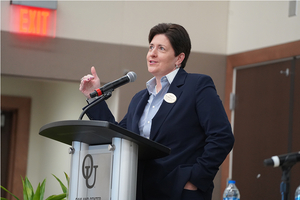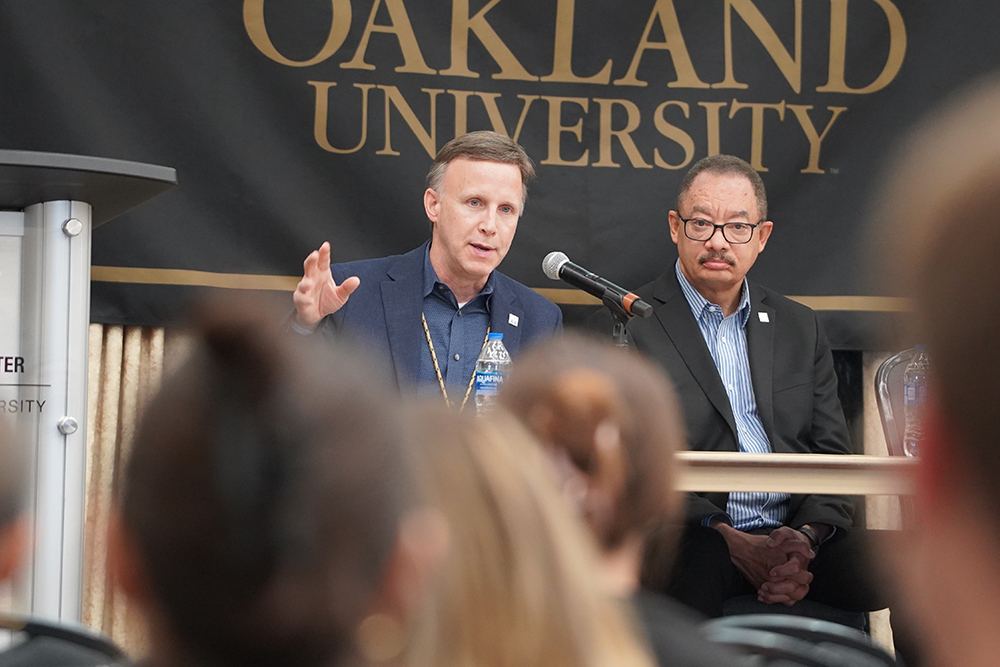The 4th Annual Oakland University Telehealth Symposium was held last week, bringing together representatives from across the university to talk about what one official called a “scientific revolution.”
“Virtual Healthcare: Linking Scholarship to Practice” was the theme of the event held Sept. 26 at Oakland University’s Oakland Center.
Hosted by the Oakland University Telehealth and Digital Innovations Council, the symposium explored the latest innovations and current trends in telehealth, AI, education, clinical practice, and research. It aimed to foster cross-disciplinary dialogue and collaboration among health care providers, educators, researchers, and students.
Speakers were Oakland University President Ora Hirsch Pescovitz, M.D.; Amy Thompson, Ph.D., provost, Oakland University; Christopher Carpenter, M.D., Stephan Sharf Dean, OUWB; and Stephanie Bauer, Ph.D., director, Center for Psychotherapy Research, Universität Heidelberg, Germany.
Changiz Mohiyeddini, Ph.D., professor, Department of Foundational Medical Studies, was event chair.
“We are on the verge of a completely new scientific approach, both in education and in health care systems, and our university aims to be on the forefront of this scientific revolution,” he said. “Our council, with the support of the provost and president, has put us on the right track to be part of this movement.”
Mohiyeddini said that the fact that so many elements of Oakland University participated in the event speaks to its importance. In addition to representation from the highest levels of the university, it was co-sponsored by OUWB, Oakland University School of Nursing, and Oakland University School of Health Sciences. (J&B Virtual Solutions also was a sponsor.)
“We have academic senior management, researchers, academic departments, and, of course, students,” he said. “When we combine all these forces, we can successfully be part of this and achieve the best outcome for our community and the public that we serve.”
After Mohiyeddini welcomed everyone, Pescovitz and Thompson each spoke. They addressed how Oakland University aims to enhance student learning, help improve public health outcomes, and narrow disparities through AI-driven initiatives, including new positions and grants to support the efforts.
Pescovitz talked about how telehealth aligns with Oakland University’s Strategic Vision 2030, which is described as “an innovative approach to navigate the rapidly changing higher education landscape.” One key component of Strategic Vision 2030 calls for school representatives to serve as “stewards of place,” which essentially refers to serving as a catalyst for the ongoing development of the region’s workforce, culture, and economy.
“Telehealth plays an important role in that kind of thinking,” said Pescovitz. “We think of ourselves as wanting to be on the cutting edge of everything that we do and everything that we do in our communities…everything we do in the spirit of discovery and everything that we do to change the world around us. That includes the delivery of care.”
 |
|---|
|
Thompson addressed technology’s impact on the |
Thompson addressed technology’s impact on the rapid transformation of health care, and OU’s commitment to be part of the evolution.
“At OU, we really consider AI to be an ally,” she said. “This is going to be something that must be embedded in the fabric of our research, (and) of our educational experience.”
“It’s not meant to take the place of an education, but it really allows us to evolve rapidly and to serve our communities more efficiently,” she added. “I see it as a driver that allows us to really sharpen our skills and to have deeper personal learning.”
Bauer joined the event virtually from Germany for her keynote presentation, “Improving Access to Care via Digital Mental Health Interventions.”
Bauer drew heavily on her research that has consistently focused on understanding barriers to mental health treatment, developing digital interventions, and exploring ways to improve access to care, particularly for people who are young.
And she emphasized that challenges remain, such as getting people to effectively use available tools and the speed of evaluation research versus technological progress.
But she generally remains optimistic.
“After more than 20 years, I still believe that digital interventions offer various opportunities to complement conventional care,” she said.
A panel discussion followed. It featured Carpenter, Pierre Morris, M.D., associate dean, Clinical Education; Linday Brandt, P.T., assistant professor, OU Physical Therapy Program; Katlyn Mosher, P.T., OMPT Specialists Physical Therapy; Shalotta Sharp, RN, Mississippi Coalition Against Sexual Assault; and Leisa Kriger, R.N., Trinity Health Oakland.
The panel discussed the impact of digital technology and AI on health care, highlighting innovations in telehealth, remote monitoring, and AI-generated documentation. Carpenter specifically talked about how note-taking technology has improved patient care.
“I face the patient and I’m not even jotting down notes … it’s great,” he said. “It frees you up to focus on the most important interface, which is with your patient.”
Like the other speakers at the symposium, the panelists identified challenges: accuracy and safety concerns; cost barriers for smaller practices; accessibility issues; and patient comfort and understanding.
Overall, they stressed the importance of human oversight, careful implementation, and addressing challenges thoughtfully.
“Overall, we’re just scratching the surface of what we’re going to be able to do,” said Carpenter.
To request an interview, visit the OUWB Communications & Marketing webpage.
This work is licensed under a Creative Commons Attribution-NonCommercial 4.0 International License.


